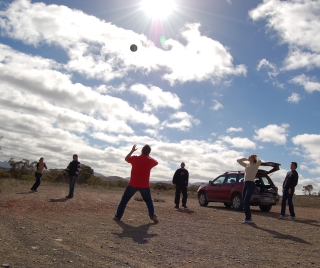In defence of space budgets: Bold steps may accidentally solve humanitarian problems
 A friend rhetorically asked me why humans are still putting great resources into researching and developing weapons, space programs and a plethora of "useless gadgets". It's a point well taken, but I feel like there is a part of the thinking process missing. Let me try to explain it.
A friend rhetorically asked me why humans are still putting great resources into researching and developing weapons, space programs and a plethora of "useless gadgets". It's a point well taken, but I feel like there is a part of the thinking process missing. Let me try to explain it.From the time of the (European) industrial revolution onwards, the old adage that "need is the mother of all invention" became ingrained in our psyche so we either consider that we should put money into researching something because we clearly need it or that we don't clearly need it so we shouldn't fund it. But I really feel like the rules have changed.
Human needs will always exist so there is always the need for ways to manage those needs. But sometimes it is not necessarily clear how need could be filled, especially for complex needs, such as the need for human rights or the need for self actualisation (as Maslow would put it).
In some cases, serendipitous investments in technological pursuits seemingly worthless in terms of humanitarian benefit have accidentally revealed potential for a derivative technology that would benefit people. I see technologies like Google Earth and the world wide web as examples... (I love any excuse to talk about Google Earth!)
We didn't need the WWW or its origins in ARPANET. It was devised to ensure USA world domination would remain intact in the case of strategic bombing of communications lines – hardly a humanitarian benefit unless you are American, but a military benefit.
Nor did We need Google Earth, although no doubt NASA and the USA defence force had some military need for the satellite photos which sustain it. Yet Google Earth is more and more becoming a tool which is not just a cool web-app, apparently useless in terms of bettering humanity, but a technology which turns out to be very helpful indeed. And let's not forget that if it wasn't for the amount of money originally spent on space programs to put the photograph-taking satellites into orbit we wouldn't have Google Earth today!
In such cases it seems like innovation and invention are the parents of totally new ways of thinking and doing things. And, in time have potential to provide genuine humanitarian benefit.
Ages ago, I blogged about a guy in Italy who pinpointed an ancient Roman ruin by observing the area near his house on Google Earth.
Now, two new stories. The first is of a group of farmers near Mumbai using Google Earth to prove they deserved more compensation from the government who acquired their lands for a state government project.
The second is a bit closer to home. Researchers at Wollongong Uni are using Google Earth to spot the sites of mega-tsunamis, possibly caused by kilometre-wide comets hitting the earth. I'm not sure how if is directly useful to humankind, but I sense that being able to predict the likelihood of a mega-tsunami would save a lot more lives than were lost in the recent Aceh tsunami disaster!
 Any more cool uses of Google Earth for human development or generally helping people, please pop a link in the comments.
Any more cool uses of Google Earth for human development or generally helping people, please pop a link in the comments.But just one final comment from me to see what comes out of it...
It could be argued that the world wide web and Google Earth are here today thanks to a consistently generous budget for the US defence department. Imagine if that generous research budget was instead controlled by the Indian department for agriculture, or another country's department for education or department for environment, or the Australian communications and IT department (I wish)... What inventions, serendipitously useful to human development and wellbeing, could we have expected to see by now?
Maslow's hierarchy of needs image courtesy of Hillary.ca blog; Volleyball in the sky image thanks to Hughes.
Categorised as: philosophy, technology
Technorati Tags: human need, human development, innovation, future, invention, research, humanitarian benefit, space program, Google Earth, Abraham Maslow, satellite, Mumbai, University of Woollongong
Labels: defence, future, Google Earth, human development, humanism, ICT, innovation, philosophy, research, space program, technology





7 Comments:
Interesting post. I believe that although many people are used to slamming our 'Merican friends, that it goes without saying that the world would be very different without their input. It is inevitable that the wealth that drove many of the US driven initiatives has had a long term impact on the world You are also right to say that Google Earth would not be what it is without the Cold War. The rest is history. Was the Cold War worth it to achieve some of the very nice day to day benefits of some of the military toys that the "Communists Are Going to Kill Me" Public Policy drove. It is very difficult to balance the good with the bad that drove the good that we enjoy now.
It's pretty amazing to think about how much the bloated US defence budget has shaped the world. I hear people criticize it a lot, but some weird fact of reality is that the US system for funding scientific innovation has worked pretty damned well. Would this money be better spent if it was given to some other organization? I don't know, there's a good argument to say that it would take any organization a long time to become as efficient at distributing large wads of cash in the way the US defence funding organizations do (which isn't to say that they do it optimally, I think they are FAR away from that).
*NOTE: word verification for this comment is NSA DR, weird...
spending arbitrarily large amounts of money for a long time can have unintended good consequences, who knew.
On innovation, Gam, on innovation, you cheeky bugger!
The consumer applications that have arised out of military R&D have historically had relatively little impact on the majority of the human population has lived (e.g. non-stick fry pans). I dont wan't to sound cynical, but Governments should be more concerned with maximising the social and economic benefit of its citizens, rather than maintaining a military bases all over the world, or updating nuclear warhead caches (which for all intents and purposes will never be used). It's largely a question of opportunity cost. Imagine if the US government diverted funding from its military to finding a cure for cancers or other medical ailments, or developing a greenhouse neutral energy solution. The potential benefits arising from their activities would affect the lives of humans all around the world from advances like this would be huge, and make Google Earth seem like a clever trinket. Granted, this sort of altruism is not likely to happen in my lifetime, but the vast sums of money used to protect US national interests tend to be wasted when it could have greater impact when allocated to the greater good.
Rowan, I think you miss the point. The US military budget DOES spend money on things like "a cure for cancer". A huge portion of the civilian research and development budget in the US comes through the defence budget. In many cases the defence agencies fund research that has only tangential applications to the military and are instead they are funded merely as a good investment strategy.
Well, it took me some time (and need to procrastinate) to read the post thoroughly. I liked the point about needs, but. playing the devil's advocate, to what extend our contemporary needs are socially constructed? If you read Schiller for example, you'll see that our needs are created in order so the technology manufacturers could sell their products. Just think about the mobile phone. 10 years ago you didn't have one and you were as happy as you are today (maybe even more). But today you have to have one, or else your need to be reachable 24/7 will not be fulfilled. Really? Do you really have to be available 24/7 or know at any given moment where your friends are? How come this need didn't exist a decade ago? The fact that, regardless of all that, humanity still comes up with rather innovative and positive uses for this stuff is interesting.
Regardless - "hardly a humanitarian benefit unless you are American" - what did they do to you, the Americans? Maybe i shall ask my housemate what did he do to you that you deprive him from a human face :)
And one last thing about the military budgets and technology - i think it is true for any country. It is true for Russia, for Israel and i would assume also for Australia... and that is a really interesting question to think what would happen if this money would go to civil channels... i am afraid that if it happens today keeping everything else as is, nothing will really change. I guess it'll require some much deeper structural changes of the societies themselves. Well, actually one is probably the reflection of the other (money allocation is the reflection of social structures). Have to think about this :)
Post a Comment
<< Home